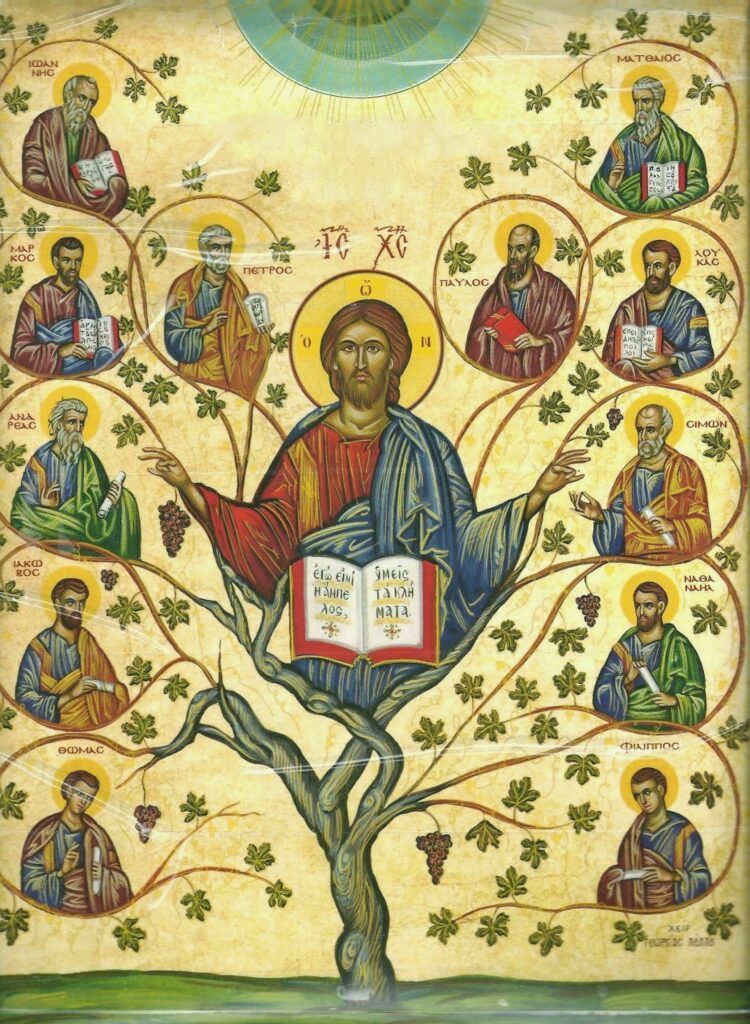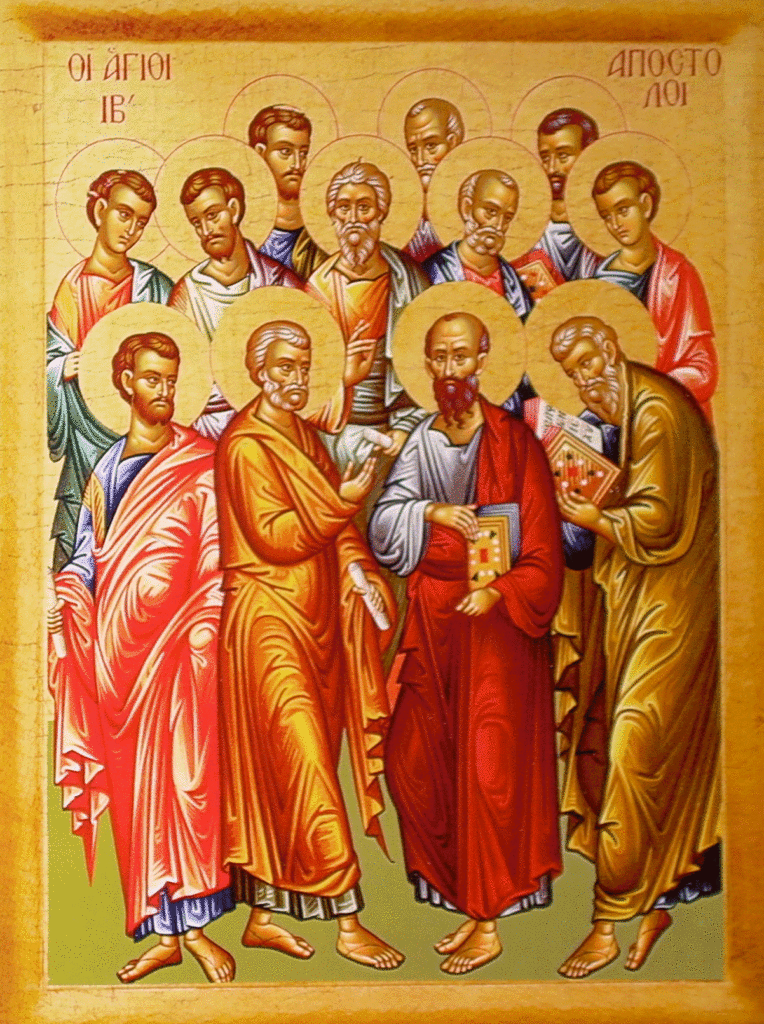In this email
Message from Fr Alexander — Church of the Twelve Apostles
The Apostles’ Fast & The Apostles Peter and Paul
Create an online forum?
Covid-19 Response
Live stream information
News of Future Services
Resources
Saints and Feasts — 26th June – 2nd July
Offer of help
Dear Friends
It is with great joy that I bring you the news, our archbishop, Metropolitan Silouan, has blessed us to have the Twelve Apostles as our patrons. Glory to God! They are the branches of the vine, as the Lord tells us, “I am the vine, you are the branches.” (John 15:5)
The work of the Apostles was to let Christ shine through them, to become transparent to the divine glory. This, too, is our role: to become alive in Christ, using the phrase of the Apostle Paul, so that “it is no longer I who live, but Christ lives in me.” (Galatians 2:20)
Every time we say the Symbol of Faith, the Creed, we say we believe “… in one, holy, catholic and apostolic Church.” This apostolic witness, this apostolic mission, this apostolic faith must become our own and the Twelve Apostles are our heavenly intercessors.
Who were the Twelve? There is confusion because we often include St Paul who was not of the Twelve in history but is included among the Twelve in theology. Their feast, 30th June, happens this week and the book on the lives of the saints, called the Synaxarion, explains this.
Church tradition … tends to include St Paul and the Evangelists Mark and Luke among the ‘Twelve’, by omitting Jude, James, the son of Alphaeus and Matthias, without depriving them of the honour due to the Apostles.
So, the number of the Twelve includes St Paul and all the Evangelists (Matthew and John were already part of the Twelve). We have, therefore (the dates refer to the apostles’ own feast day):
Peter and Paul (29th June), the foremost of the Apostles and many of their missionary journeys are recorded in the Book of Acts. St Peter preached so strongly on the day of Pentecost that it cut to the heart of those listening and three thousand were baptised and brought into the Church. St Paul’s work saw the Church being open to both Jew and Gentile. Both were martyred in Rome in about the mid 60s, St Peter by crucifixion upside down, St Paul by beheading.
Andrew the First-Called (30th November), brother of Peter, who proclaimed the Gospel in the coastal regions of Bithynia, Pontus and Armenia. Returning by way of Pontus and Byzantium, he travelled as far as Greece, where he was crucified at Patras in Achaia.
James, the son of Zebedee (30th April), who witnessed to the Resurrection through the whole of Judaea. He perished by the sword on the orders of King Herod Agrippa, who was jealous of his renown.
John the Theologian (26th September), the brother of James, who rested on the Lord’s breast. After having proclaimed Christ in the province of Asia, he was exiled to Patmos on the orders of Dormitian, where he wrote the Gospel and the Apocalypse. He finally returned to Ephesus, where he fell asleep in peace at a great age.
Philip (14th November), who came from Bethsaida in Galilee like Peter and Andrew. He proclaimed the Good News in the province of Asia and in the region of Hierapolis in Phrygia, in the company of his sister Mariamne and of St Bartholomew. He died in Hierapolis, being crucified by the pagans.
Thomas, also called Didymus (6th October), who spread the Gospel among the Parthians, Medes, and Persians, and the inhabitants of India. He was pierced to death by pagan lances.
Bartholomew (11th June) preached in Lydia and in Mysia along with the Apostle Philip. After the death of the latter, he continued his mission in Arabia Felix (now north Yemen), in Persia and in India, and finished his course in Armenia, where he was crucified in Albanopolis (or Urbanopolis). His body was placed in a lead box and thrown into the sea, but was later recovered in Sicily.
Matthew, the Publican (16th November), formally called Levi, was the brother of James the son of Alphaeus. After having written his Gospel, he left on a mission to the Parthenians. It is said that he was burned alive in Hierapolis on the banks of the Euphrates.
James the son of Alphaeus (9th October) proclaimed Christ in Gaza and in and around Eleutheriopolis. He was crucified in the town of Ostracine in Egypt.
Simon the Zealot (10th May), from Cana in Galilee, proclaimed the Good News in Mauritania in North Africa; it is said that he then left for Great Britain, where he was crucified.
Jude, a kinsman of the Lord (19th June), also called Thaddeus and Levi by St Matthew, departed on a mission to Mesopotamia, and finished his days in the region near Mount Ararat, where he was hanged and pierced with arrows by pagans.
Matthias (9th August) was added to the number of the Apostles after the Ascension to replace Judas the traitor. He preached the Gospel in Ethiopia, where he gave his soul into God’s hands after suffering numerous tortures at the hands of the pagans.
Mark (25th April), a spiritual son of St Peter, who evangelised Alexandria and the Pentapolis, and who suffered martyrdom by being crushed under the weight of a rock.
Luke (18th October), the physician and first iconographer who, after having accompanied St Paul on his journeys, wrote his Gospel under the Apostle’s influence. Finally settling in Thebes in Boetia, he died there in peace at the age of eighty-four.
May they be a witness to us, may they be an example to us, may they be our constant heavenly intercessors before the Lord. As we sing in their Apolytikion:
O Holy Apostles,
intercede with our merciful God,
to grant our souls forgiveness of sins.
The Apostles’ Fast & The Apostles Peter and Paul
The fast has almost ended: on Monday we will celebrate the feast of the Apostles Peter and Paul. Our own feast day, The Synaxis of the Twelve Apostles, always falls the day after so this fast is a preparation for our own feast.
The feast of the two Chiefs-of-the-Apostles, Peter and Paul, is the patronal feast of the brotherhood led by Archimandrite Philip in Shropshire: we offer them our prayers and wish them many years!
The feast reminds us that two saints can be in conflict — we can read about it in Galatians 2, particularly verses 11–14 — yet both be reconciled and still be saints.
Create an online forum?
Would you be interested in meeting online? One-to-one or as a group? We could make use of technology to create an online community, ask questions, read together, pray together?
Let me know! Email webenquiry@orthodoxeastleigh.uk.
Covid-19 Response
We should follow government advice whenever we can. We are not being asked to give up or deny our Faith, but many are being told to stay socially isolated and this will last, perhaps, for many months.
How can you respond? Pray. We pray because we love and because we know the power of prayer. We pray not as a last resort but as a first response.
Is there anything you need or anything you can offer? Let me know — my telephone number and email address are on each of the emails: please get in contact if you are feeling isolated: I am here for you.
Are you willing to contact isolated people via email or phone? Let me know! It would be good to match up those who need help with those who can offer it.
Live stream
The Monastery of Saints Antony and Cuthbert, Shropshire, is live-streaming its services for all who are unable to go to their own churches. These are over YouTube and can be accessed here:
https://www.youtube.com/channel/UCfWMaefJYqFEZkYiK2WmeEw
Usually Vespers on Saturday evenings at 5 pm and Matins and Liturgy on Sunday mornings from 7.30 am.
News of Future Services
While the lockdown measures remain in place we are not able to meet for worship: but can we start planning now for what we will do when we’re able? Please get in contact if you are able to offer ideas, suggestions or help.
Resources
Have a look at our website — orthodoxeastleigh.uk
If you click on the “Blog” link, or directly here, you will see all past emails as well as sermons etc.
Our Facebook Page, facebook.com/orthodoxeastleigh, too, has daily additions during the week as well as on feast days. Please do like and share our page and content so we may reach a wider group of people.
Do you receive the weekly (on Fridays) text message? If not, then let me know.
Saints and Feasts
Friday 26th June — St David of Thessaloniki (c 540).
Saturday 27th — St Joanna the Myrrh-bearer (1st). St Austell the Hermit (Cornwall, 6th).
Sunday 28th — 3rd Sunday after Pentecost. Translation of the relics of the Wonderworking Unmercenaries Cyrus and John (412).
Monday 29th — Holy, Glorious and All-praised Leaders of the Apostles, Peter and Paul.
Tuesday 30th — Synaxis of the Holy, Glorious and All-praised Twelve Apostles.
Wednesday 1st July — Wonderworking Unmercenaries Cosmas and Damian, Martyrs at Rome (3rd). Julius and Aaron, Protomartyrs of Wales (c 304). St Servanus, Apostle of Western Fife (8th).
Thursday 2nd — Deposition of the Honourable Robe of the Most-Holy Theotokos at Blachernae (5th). St Stephen the Great, Prince of Moldavia, Defender of Orthodoxy (1504). St John (Maximovitch), Bishop of Shanghai and Archbishop of San Francisco (1966).
Can I help you?
I am here for you, you need only ask. Is there a way I can support your life of faith? Get in touch.
Can you help the mission?
Yes, absolutely. Offer yourselves to the Lord: pray! Make available to him all your talents and ask him how he would like you to use them — listen for his reply.
I ask your prayers for me.
With love in Christ
Fr Alexander
webenquiry@orthodoxeastleigh.uk


